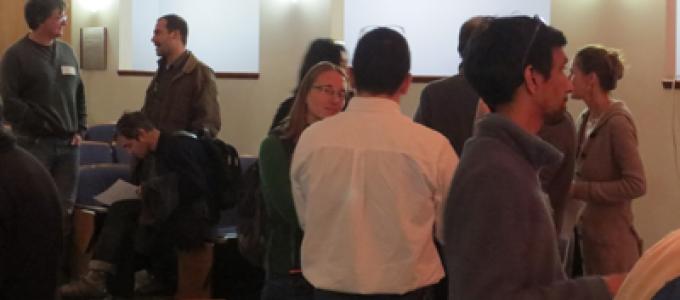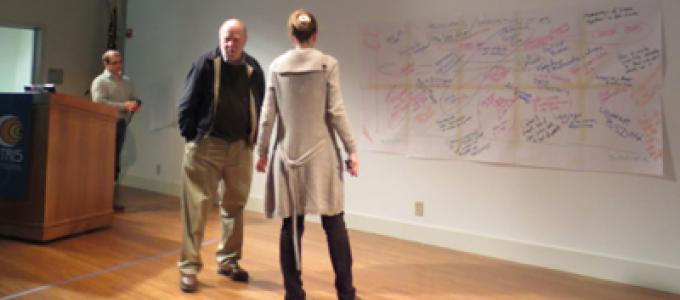Upwards of 60 [correction: 70] attendees at this morning's Supporting Data Science workshop, organized by VC Research. Pretty amazing for something organized in 3 days and held at 8 a.m. on a Saturday. More amazing: it actually worked. The program is here. 10 lightning talks (Josh Bloom, Charles Marshall, Henry Brady, Fernando Perez, Ion Stoica, Cathryn Carson, Bin Yu, Dave Dineen and Cyrus Afrasiab (for Berkeley Phylogenomics Group, Kimmen Sjölander), Lee Fleming, Marti Hearst), 6 break-out groups, deft moderation by David Culler and Saul Perlmutter. Observations: This didn't turn into "my method is the right one" (or "my grant is bigger than your grant"). I was impressed by the engagement with "sociology" -- career trajectories, reward systems, forms of organization/collaboration, the university as a site of institutional obstacles as well as advantages. This is a sociological problem. And an institutional one, not that those are separate. There were good sessions on software development ecosystems and data management/archiving/curation. I was lucky enough to debrief afterwards with a real sociologist, who seemed not to want to disabuse me of my sense that this went very well. We ended up talking a lot about education, even though the foundations seem to be giving contradictory signals. How could we not talk about grad student training? In the D-Lab corner, grad students are critical. They're often the ones pushing us forward. Amazing connectivity. We found out about things going on in other corners of campus. Even after a year digging out pockets of data science across Berkeley, I was struck by how much I hadn't heard of. I'm looking forward to talking with these people in the future. How to make our own efforts more visible to ourselves? D-Lab's starting efforts are here, here, and (mostly social sciences) here. Faculty were maybe 25% of the group (including 2 [correction: 3] deans, several current/former dept chairs, and VC Fleming). Large constituencies of postdocs and grad students, academic/scientific staff from all over (PI labs, departmental labs, IST, the Library, D-Lab, ...). Real openness to the social sciences as partners. (This grant isn't supposed to include the humanities, but they're part of the Berkeley deal, too.) Maybe I have too many scars from having migrated from physics to history -- I've heard so much disparagement of what I do. I didn't hear it today. My own view: Berkeley's secret strength is its across-the-board excellence. If we can figure out what it'd really mean to partner our strength in stats, CS, and engineering with our incredible capacity in social science, we can't be matched anywhere in the world.
Sign up for our weekly newsletter!


